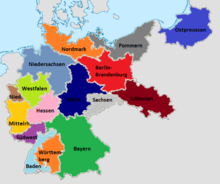1933–34 Gauliga Bayern
| Season | 1933–34 |
|---|---|
| Champions | 1. FC Nürnberg |
| Relegated | |
| German championship | 1. FC Nürnberg |
1934–35 → | |

The 1933–34 Gauliga Bayern was the inaugural season of the league, one of the 16 Gauligas in Germany at the time. It was the first tier of the football league system in Bavaria (German:Bayern) from 1933 to 1945. The Gauliga Bayern had replaced the Bezirksliga Bayern which had been played in two divisions, north and south, as the top tier of football in Bavaria at the end of the 1932–33 seasons.
The Gauligas in Germany replaced the seven regional championships and a large number of local leagues that existed in Germany until then and were established after the rise of the Nazis to power in 1933.[1][2]
The league champions 1. FC Nürnberg qualified for the 1934 German football championship, where it finished first in its group with Dresdner SC, Borussia Fulda and Wacker Halle and qualified for the semi-finals. After defeating Viktoria 89 Berlin 2–1 Nürnberg advanced to the final where it lost 2–1 to FC Schalke 04. For 1. FC Nürnberg it was the seventh time the club reached the final and the first time it lost, having won five national championships from 1920 to 1927 and also participated in the inconclusive 1922 final.[3][4] For Nürnberg it was the first of seven Gauliga championships the club would win in the era from 1933 to 1944.[5]
After attempts to establish professionalism in German football in 1932 the rise of the Nazis to power put a sudden end to this, forcing all football leagues in Germany, including the Gauligas, to remain strictly amateur.[6] The new political situation in Germany at the time of the introduction of the Gauligas, the Nazis having come to power, also meant that Jewish players and officials were no longer permitted to take part in German sport clubs.[7] For Gauliga clubs like FC Bayern Munich, taunted as Judenklub, this meant it lost important figures that had built the club up to win its first German championship in 1932. After president Kurt Landauer and coach Richard Dombi had to leave the club because of their Jewish background, the club declined.[8]
Table
The 1933–34 season was the inaugural season of the league with all clubs coming from the two regional divisions of the Bezirksliga Bayern.
| Pos | Team | Pld | W | D | L | GF | GA | GD | Pts | Promotion, qualification or relegation |
|---|---|---|---|---|---|---|---|---|---|---|
| 1 | 1. FC Nürnberg (C) | 22 | 15 | 4 | 3 | 61 | 26 | +35 | 34 | Qualification to German championship |
| 2 | TSV 1860 München[a] | 22 | 13 | 7 | 2 | 48 | 15 | +33 | 33 | |
| 3 | FC Bayern Munich | 22 | 11 | 5 | 6 | 53 | 35 | +18 | 27 | |
| 4 | 1. FC Schweinfurt 05 | 22 | 11 | 4 | 7 | 38 | 37 | +1 | 26 | |
| 5 | Schwaben Augsburg | 22 | 10 | 5 | 7 | 45 | 38 | +7 | 25 | |
| 6 | SpVgg Fürth | 22 | 8 | 6 | 8 | 41 | 32 | +9 | 22 | |
| 7 | ASV Nürnberg | 22 | 8 | 4 | 10 | 38 | 38 | 0 | 20 | |
| 8 | SSV Jahn Regensburg[b] | 22 | 7 | 5 | 10 | 36 | 43 | −7 | 19 | |
| 9 | FC Wacker München | 22 | 7 | 4 | 11 | 36 | 50 | −14 | 18 | |
| 10 | 1. FC Bayreuth (R) | 22 | 5 | 7 | 10 | 31 | 52 | −21 | 17 | Relegation |
| 11 | FV Würzburg 04 (R) | 22 | 4 | 5 | 13 | 27 | 55 | −28 | 13 | |
| 12 | 1. FC München[c] (R) | 22 | 3 | 4 | 15 | 26 | 59 | −33 | 10 |
- ^ TV München 1860 and SV 1860 München merged on 13 March 1934 to form TSV 1860 München
- ^ Sportbund Jahn Regensburg merged on 24 May 1934 with Schwimmverein Regensburg and SV 1889 Regensburg to form SSV Jahn Regensburg
- ^ 1. FC München was formed in a merger of DSV München and Teutonia München after the 1932–33 season
References
- ^ "German championship 1933". Rsssf.com. Retrieved 30 January 2016.
- ^ "Geschichte" [History]. suedfv.de (in German). Southern German Football Association. Retrieved 30 January 2016.
- ^ "(West) Germany -List of champions". Rsssf.com. Retrieved 30 January 2016.
- ^ "German championship 1934". Rsssf.com. Retrieved 30 January 2016.
- ^ kicker, page: 245
- ^ "Der lange Weg zum Profi" [The long way to professionalism]. bpb.de (in German). Federal Agency for Civic Education. 18 June 2014. Retrieved 31 January 2016.
- ^ "Juden im deutschen Fußball" [Jews in German football]. bpb.de (in German). Federal Agency for Civic Education. 4 May 2006. Retrieved 31 January 2016.
- ^ "Schwere Zeiten für den "Judenklub"" [Difficult times for the Jewish club]. bpb.de (in German). Bayerischer Rundfunk. 12 August 2015. Retrieved 31 January 2016.
Sources
- kicker-Almanach 1990 [Yearbook of German football] (in German). Kicker (sports magazine). 1990. ISBN 3-7679-0297-4.
- Die deutschen Gauligen 1933–45 [Tables of the Gauligas 1933–45] (in German). DSFS.
- 100 Jahre Süddeutscher Fußball-Verband [100 Years of the Southern German Football Association] (in German). Munich: Southern German Football Association. 1997.
- Fußball-Jahrbuch Deutschland 1930/31 – 1932/33 [Tables of the top-level league's in Germany 1930–33] (in German). DSFS.
External links
- Das Deutsche Fussball Archiv (in German) Historic German league tables
